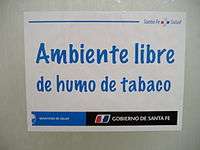Smoking in Argentina
Smoking in Argentina accounts for 15% of total tobacco consumption in the americas. There are a number of smoking restrictions in place in different jurisdictions, and a nationwide governmental campaign against tobacco smoking and advertising. Since June 1, 2011 a smoking ban in all of Argentina prohibits smoking in workplaces, all public indoor areas, schools, hospitals, museums and libraries, theatres, and all public transport.[1]
The smoking percentage of the adult population of Argentina is not known;[2] tobacco causes more than 100 deaths every day in Argentina (40,000 per year, 6,000 due to secondhand smoke), and the cost of the treatment of tobacco-related diseases amounts to 6020 million Argentine pesos ($1324 million USD) per year, 15.5% of the total public expenditure on health care. The government collects 3500 million pesos per year in taxes on cigarettes.
Law
National Law 23344, passed on 29 August 1986, established restrictions on advertising and promotion of tobacco, and dictated that cigarette packs must include a legend warning that Smoking is harmful to health, but did not include sanctions against violations of the law;[3] these were added later, and then partially vetoed.
WHO Framework Convention
In September 2003 Argentina signed the WHO Framework Convention on Tobacco Control, though ratification was delayed by two years. Analysts blame tobacco industry interests for this delay, as with previous failures in implementing serious anti-smoking policies.[4][5]
Legislative deadlock
As of 2006, a proposal to prohibit smoking in all public and enclosed spaces, sent by the Executive to the National Congress in August 2005, was awaiting consideration. Legislative lobbying from the tobacco industry proposed an alternative, weaker law, championed by Jujuy Province Senator Liliana Fellner, who called herself "the voice of the [tobacco] producers" (Jujuy is one of the seven tobacco-producing provinces in Argentina).[6]
Public sentiment
A nationwide telephone survey published in August 2006 showed overwhelming support of the population for laws that establish "smoke-free spaces" in public spaces such as offices, factories, shopping malls and banks (93.4% overall support, 85% among smokers), and that completely forbid smoking in schools, universities and hospitals (97%). More than three quarters among the surveyed (including almost two thirds of the smokers) also supported smoking bans for bars and restaurants.[7]
Provincial and municipal laws on smoking
In 2003, according to national sources, 75% of the Argentine provinces had some form of smoke-free legislation. Either in addition to or in the absence of provincial laws, many municipalities have local regulations to the same effect. Fines might be established for trespassers (tobacco companies, businesses and private individuals). The actual application of this legislation varies considerably.
- In Santa Fe it is forbidden to smoke in enclosed public spaces (offices, restaurants) and to sell tobacco to minors since 2005. (Provincial Law 12432) [8][9]
- In La Rioja and Chubut it is forbidden to smoke in enclosed spaces and in public offices.
- In Mendoza there are also "smoke-free spaces" in schools, hospitals and other public buildings.
- In Córdoba (Provincial Law 9113, Córdoba Municipal Order 11039) and Tucumán (Provincial Law 7575), smoking bans for public places are in effect since mid-2006.[10][11]
- In Buenos Aires City it is forbidden to smoke in government offices and (since October 2006) in all public enclosed spaces, except in businesses of more than 100 m² where smoking areas have been set up. (Law 1799)[12]
- Chaco, Neuquén, Tierra del Fuego and Salta have similar laws.
See also
- Health in Argentina
References
- (in Spanish) National Law Nº26,687 - Article 23
- (in Spanish) Ministry of Health. National Program on Tobacco Control Archived 2006-06-23 at the Wayback Machine
- (in Spanish) Law 23344 — Ley de limitación de las publicidades sobre cigarrillos y obligatoriedad de inscripción de envases
- Ernesto M. Sebrie; Joaquin Barnoya; Eliseo Perez-Stable; Stanton A. Glantz (2005). "Tobacco Industry Dominating National Tobacco Policy Making in Argentina, 1966-2005". Center for Tobacco Control, Research and Education, University of California, San Francisco. Retrieved 2006-06-23. Cite journal requires
|journal=(help) - Tobacco.org — Tobacco news and information: Argentina.
- (in Spanish) Página/12. 18 September 2006. Una guerra legislativa que levanta humo
- (in Spanish) Clarín. 24 August 2006. La mayoría de la gente, a favor de los espacios libres de humo.
- (in Spanish) La Capital. 10 November 2005. En medio de una fuerte polémica, Obeid firma hoy la ley "antipucho". Archived 2006-09-16 at the Wayback Machine
- (in Spanish) La Capital. 23 June 2006. Multas de hasta $ 4.500 para los dueños de bares donde se fume.
- (in Spanish) La Nación. 29 June 2006. Tucumán se despide del cigarrillo.
- (in Spanish) Clarín. 1 June 2006. En Córdoba ya no se puede fumar en lugares públicos ni privados.
- (in Spanish) Clarín. 1 October 2006. Ley antitabaco: largan los controles y hay pocos locales reformados.
